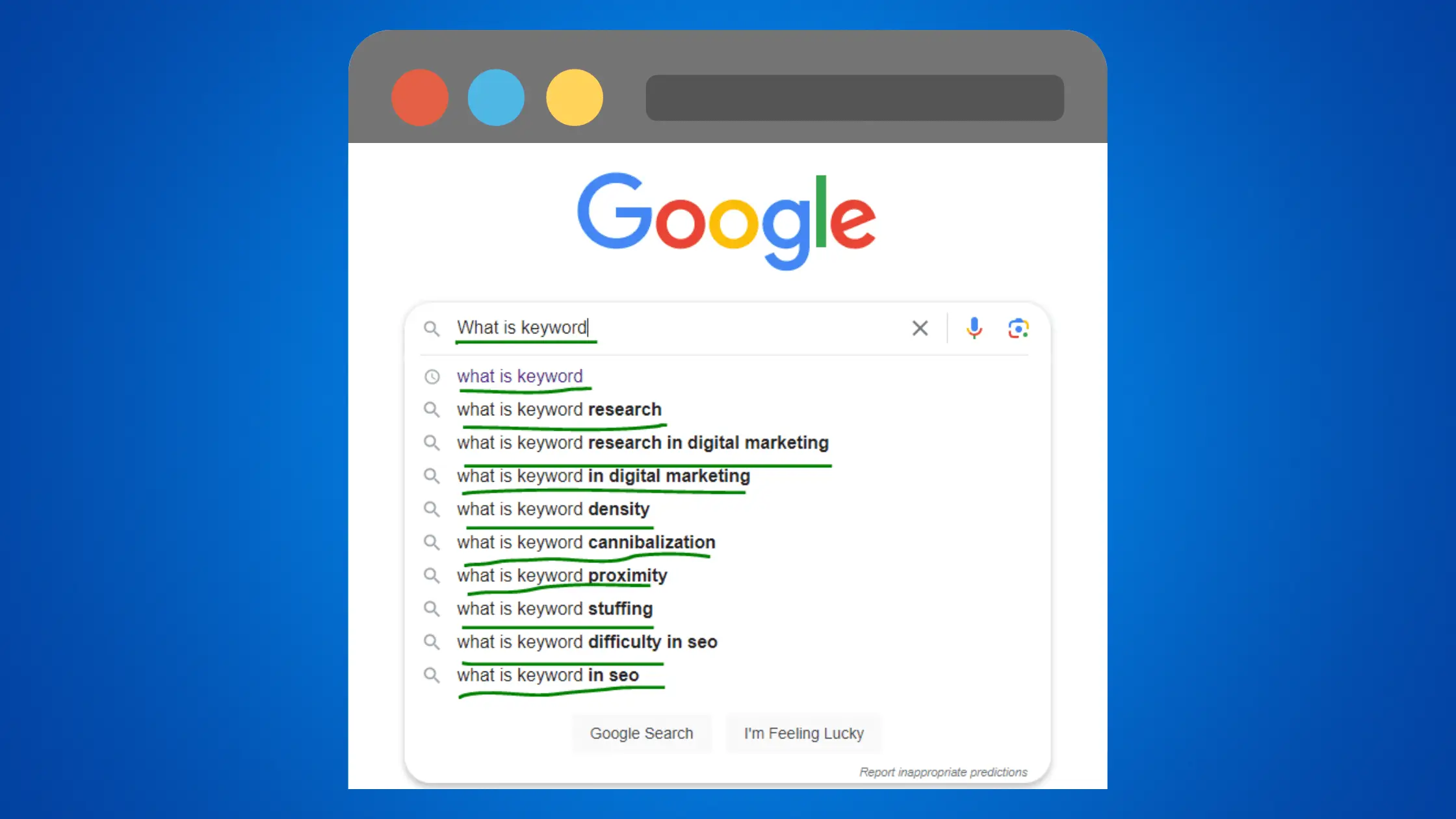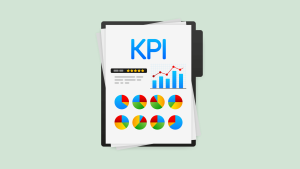What is a Keyword?
A keyword is essentially a collection of one or more words. Users refer to any word or phrase entered into a search engine’s bar as a keyword. The search engine, in turn, generates results based on these keywords.
Relation Between Search Engine & Keyword
When you input a word or phrase into the search bar, you turn that specific term into the keyword guiding the search engine to retrieve relevant information. As a result, the results page you receive also includes keywords related to the original query.
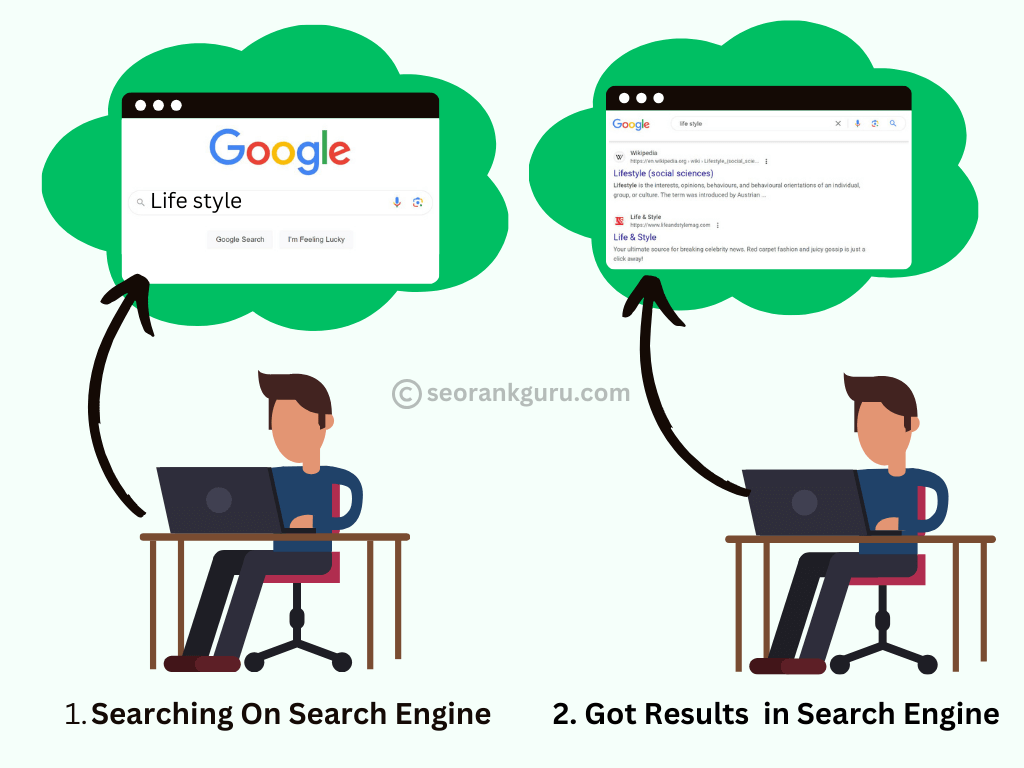
People use it to optimize content for search engines and to help readers understand what the content is about.
People typically identify keywords through keyword research, which involves analyzing the search terms that people use to find information on a particular topic.
In digital marketing, businesses optimize website content and use keywords to attract traffic and generate leads.
Imagine you’re trying to find a recipe for chocolate chip cookies on Google. You might type in the keyword “chocolate chip cookies” in the search bar. The search engine will then scan through millions of web pages and return a list of results that are relevant to that keyword. The websites that have optimized their content for that specific keyword will be more likely to appear at the top of the search results, making it easier for you to find the recipe you’re looking for.
Types of Keywords
- Short-tail keywords:
Short-tail keywords, also known as head keywords, are broad search terms that typically consist of one or two words.
Examples of short-tail keywords include “shoes“, “fitness” and “dog food“. Because these keywords are so general, they often have a high search volume and high competition.
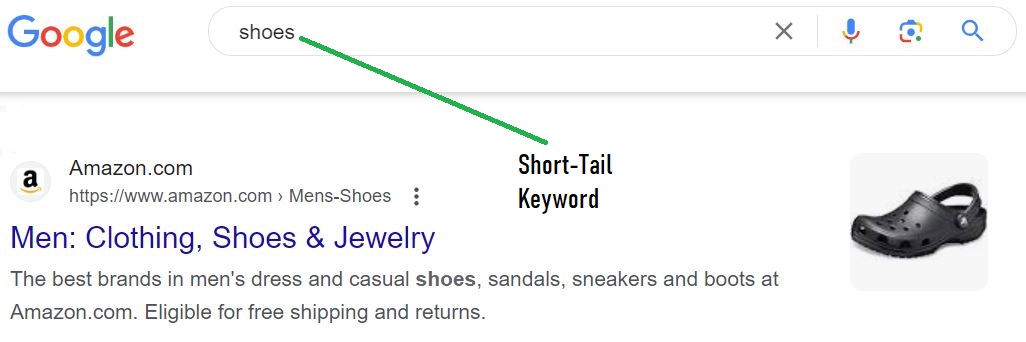
As a result, ranking for short-tail keywords can be difficult and require a significant investment in time and resources.
- Long-tail keywords
Long-tail keywords are more specific search terms that consist of three or more words.
Examples of long-tail keywords include “running shoes for women“, “beginner fitness routines” and “grain-free dog food brands“. While these keywords may have lower search volume than short-tail keywords, they are often less competitive and more targeted, which can result in higher conversion rates and a lower cost per click in PPC advertising campaigns.
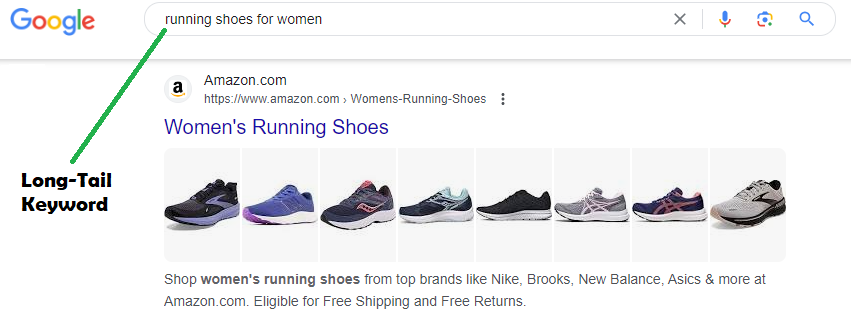
- Broad match keywords
Broad match keywords are search terms that are loosely related to the keywords you are targeting.
Example: If you are targeting the keyword “running shoes,” a broad match keyword could be “athletic footwear.” While broad match keywords can help increase the reach of your ads, they can also result in irrelevant clicks and a lower quality score, which can negatively impact your PPC campaign’s performance.

- Exact match keywords
Exact match keywords are search terms that are an exact match to the keywords you are targeting.
Example: If you are targeting the keyword “running shoes,” an exact match keyword would be “running shoes.” Exact match keywords yield better campaign performance, though they may have lower search volume than broad match.
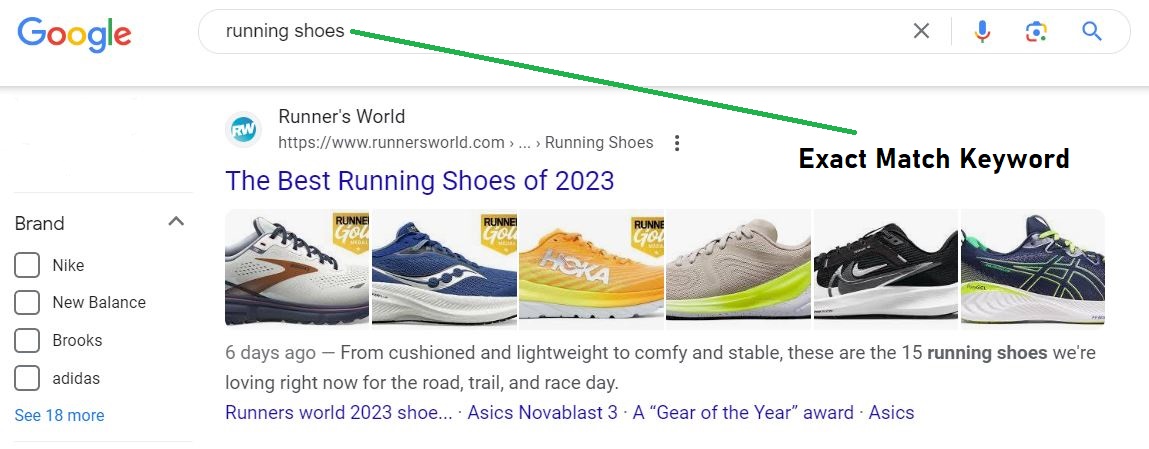
- Phrase match keywords
Phrase match keywords are search terms that include the exact keyword phrase you are targeting, along with other words before or after it.
Example: If you are targeting the keyword “running shoes“, a phrase match keyword could be “best running shoes for women“. Phrase match keywords target more specifically than broad match keywords but less specifically than exact match keywords.

Role of Keywords in Search Engine Optimization (SEO)
A. Explanation of how keywords impact SEO
Keywords are a crucial component of SEO because they help search engines understand what your website or web page is about.
When a user enters a search query into a search engine, the search engine uses an algorithm to identify relevant web pages based on the keywords in the query.
By incorporating relevant keywords into your website content, you can improve your chances of ranking higher on search engine results pages (SERPs) for those keywords.
B. Importance of keyword research in SEO
Keyword research is the process of identifying the keywords that your target audience is searching for and incorporating those keywords into your website content.
Effective keyword research can help you identify the keywords with the highest search volume.
Simultaneously, it enables you to pinpoint those with the lowest competition, allowing optimization for maximum SEO impact.
C. Best practices for incorporating keywords in SEO
Here are some best practices for incorporating keywords into your website content:
- Use keywords in your page titles:
Including your target keyword in your page title can help signal to search engines what your page is about.
- Use keywords in your meta descriptions:
Your meta description is the brief summary that appears below your page title on search engine results pages. Including your target keyword in your meta description can help improve click-through rates. It also signals to search engines what your page is about.

- Use keywords in your header tags:
Header tags (H1, H2, H3, etc.) are used to structure your content and make it easier to read.
Utilizing your target keyword within header tags not only signals to search engines your page’s theme but also enhances ranking opportunities for that keyword.
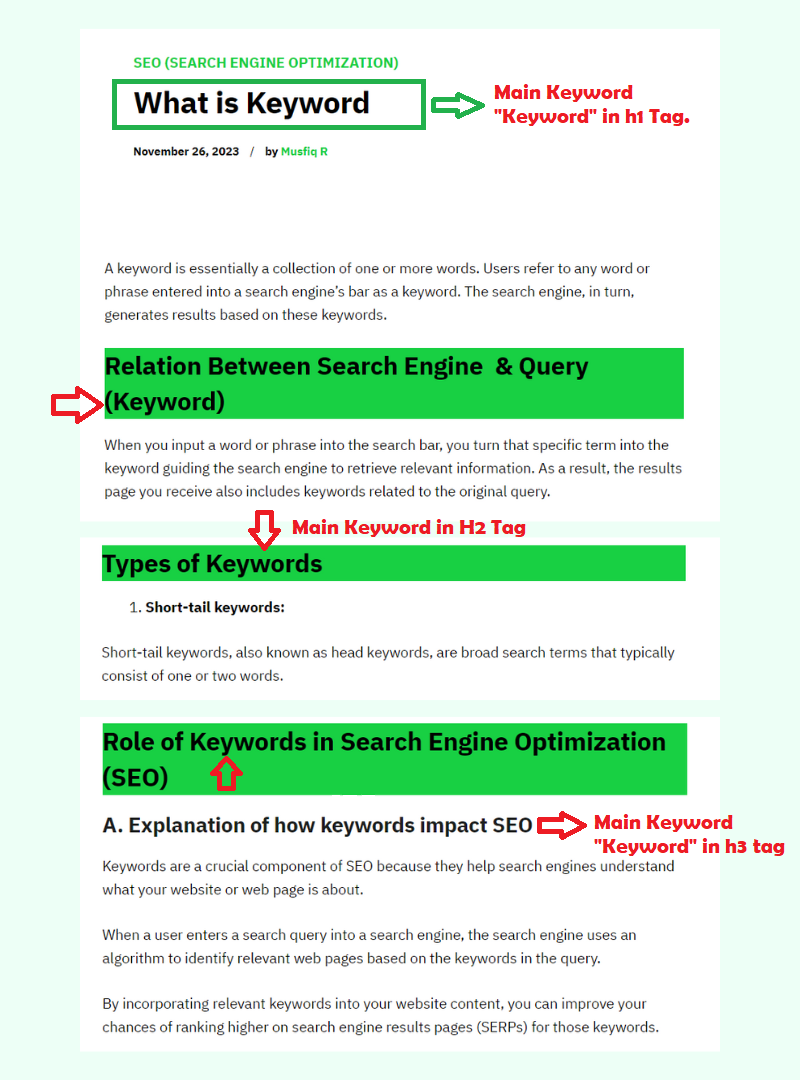
- Use keywords in your body copy:
Incorporating your target keyword into the body copy aids in signaling to search engines the page’s content and enhances the ranking potential for that keyword.
However, using keywords naturally and avoiding overuse is important, as search engines may perceive it as spammy.
- Use keywords in your image alt tags:
Including your target keyword in your image, alt tags can help signal to search engines what your images are about and improve your chances of ranking for that keyword.
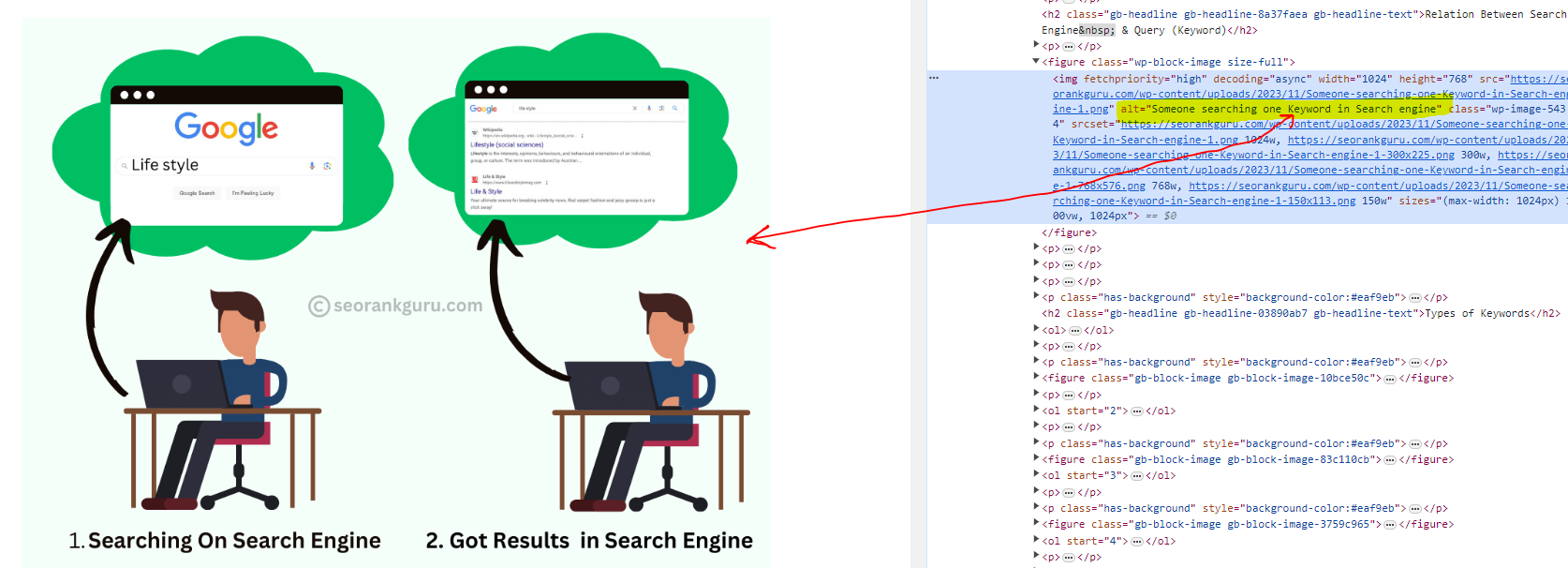
- Use internal links with relevant anchor text:
Internal linking is the practice of linking to other pages on your website from within your content.
Using relevant anchor text that includes your target keyword can help signal to search engines.
This improves your chances of ranking for that keyword and communicates what your pages are about.
- Use external links with relevant anchor text:
External linking is the practice of linking to other websites from within your content. Employing pertinent anchor text that incorporates your target keyword assists in signaling to search engines the content of your pages. This practice also boosts your chances of ranking for that keyword.
How to Keyword Research?
Keyword research is the process of identifying the keywords and phrases that people use to search for information online.
Using this information to optimize website content, pay-per-click (PPC) advertising campaigns, and other digital marketing efforts increases visibility. It also drives traffic to the website.
Importance of Researching Keywords
The importance of keyword research cannot be overstated. It is the foundation of any successful SEO or digital marketing campaign.
Keyword research helps you understand your target audience and what they are searching for online.
It also helps you identify the keywords and phrases that your competitors are using. This allows you to create content that addresses the same topics but with a unique perspective.
Keyword research also helps you identify gaps in the market. You can fill these gaps with content that provides valuable information to your target audience.
Creating content that answers their questions and addresses their pain points is key. This establishes you as an authority in your industry and builds trust with your audience.
Techniques for Conducting Keyword Research
There are several techniques you can use to conduct keyword research:
Google AdWords Keyword Planner – This tool helps you find keywords related to your business or website. It provides information on search volume and competition level for each keyword.
Google Trends – This tool helps you identify the popularity of a keyword over time and compare it to other keywords.
Competitor analysis – By analyzing the keywords used by your competitors, you can identify potential keywords to target in your content.
Best practices for conducting effective keyword research
Here are some best practices for conducting effective keyword research:
- Begin with a comprehensive industry analysis to identify key trends and topics.
- Utilize a mix of short-tail and long-tail keywords to capture a diverse range of search intents.
- Regularly update your keyword list based on evolving industry dynamics and user behavior.
- Leverage competitor analysis to identify and capitalize on gaps in keyword targeting.
- Prioritize relevance and user intent over search volume when selecting keywords.
- Incorporate location-specific keywords for geo-targeted optimization, especially for local businesses.
- Use keyword research tools to gather insights and refine your strategy, such as Google Keyword Planner and SEMrush.
Using Keywords in Content Creation
Keywords play a critical role in content creation, especially in digital marketing. They help ensure that your content reaches the right audience and ranks highly on search engine result pages (SERPs).
In this section, let’s explore how to use keywords in content creation and discuss best practices for their effective incorporation.
A. Explanation of how keywords are used in content creation
Keywords are used in content creation to help search engines understand the main topics and themes of the content.
By incorporating keywords in the content, search engines can easily index and rank the content based on relevance to a specific query.
Additionally, incorporating keywords in the content can help improve the readability and flow of the text.
B. Best practices for incorporating keywords in content
Keyword density
Keyword density refers to the number of times a keyword appears in a piece of content relative to the total number of words in the content.
The ideal keyword density varies based on the length and format of the content, but a good rule of thumb is maintaining a density between 1-3%.
Anything above this may be considered keyword stuffing and can result in penalties from search engines.
For example, if you have a 500-word blog post and you want to target the keyword “digital marketing,” you should aim to use the keyword between 5-15 times throughout the post.
Keyword placement
The placement of keywords in the content can also impact its relevance and ranking. Generally, it’s best to include the keyword in the title, introduction, conclusion, and subheadings.
However, it’s important to avoid overusing the keywords in the content, as this can negatively impact the readability and quality of the content.
For example, if you’re writing a blog post about “digital marketing tips,” you should include the keyword in the title and the introduction.
Additionally, you should use the keyword in subheadings such as “Email Marketing,” “Social Media Marketing,” and “Content Marketing.”
Use of synonyms and related terms
Using synonyms and related terms in content enhances relevance, ranking, readability, and flow of the text for broader search queries.
For example, if you’re writing a blog post about “digital marketing,” you could use related terms such as “online marketing,” “internet marketing,” or “web marketing.” You could also use synonyms such as “online advertising,” “digital advertising,” or “web advertising.”
In Conclusion, Keywords are an essential part of modern communication, particularly in the digital age. They help search engines understand the content of a web page or blog post and are used in various contexts, including SEO, content creation, and online marketing. When using keywords, it’s essential to use them strategically and naturally. Avoid keyword stuffing, which can result in penalties from search engines. If you haven’t already, conduct keyword research to identify relevant keywords for your business or website. Use these keywords strategically in your content to improve your chances of ranking higher in search engine results pages.

